Social Entrepreneurship Festival 2018: a report
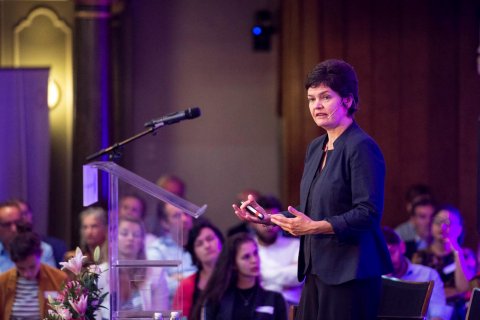
This year’s Social Entrepreneurship Festival on 19 and 20 June connected new ways of economic thinking to thriving new, innovative business models aimed at social and environmental goals.
The photo's in this report were made by Robert Oosterbroek.
June 19th, Conference day
The Academic Hall in Utrecht was the historical and inspiring venue for the conference day of the festival. Kate Raworth, the main guest of the day, has spurred an interesting debate by making a call for a different way of ‘viewing’ and ‘delivering’ economics. In her book ‘Doughnut Economics’ Raworth highlights the need to avigate between social and planetary boundaries.
Janneke Plantenga, Dean of the Faculty of Law, Economics and Governance, opened the conference by stressing how the topic of social entrepreneurship resonates with the mission of Utrecht University. In the opening keynote speech, Kate Raworth vividly explained the rationale behind her framework of the doughnut. She highlighted the role businesses should take in order to ensure that welfare is sufficiently redistributed and that economic activities are regenerative.
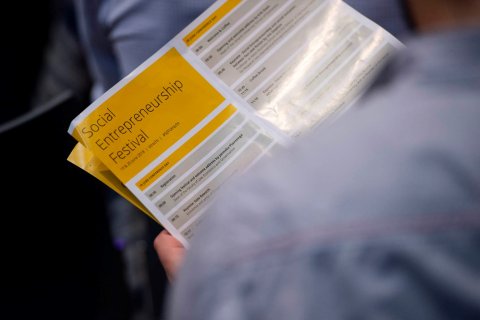
Rethinking economic principles towards societal challenges in the 21 century
In the subsequent panel discussion, experts representing various connected fields challenged, supported and nuanced some of Raworth’s views. Chief economist of ABN AMRO Han de Jong highlighted the Dutch bank’s efforts towards societal challenges in recent years. Furthermore, he expressed his doubts about the use of Raworth’s framework in practice, where in his view the forces of basic market mechanisms, growth and globalization will keep dominating.
A rather opposing view came from Marjan Minnesma, director of Urgenda. She emphasized the urgency of taking bolder and quicker action, as there will be little time left until the planet’s resources will be depleted. Guido van Staveren van Dijk, founder of Moyee Coffee is a typical example of a social entrepreneur fully committed to tackle social challenges. He explained how Moyee is trying to establish a fairchain (rather than fair trade) in the coffee value chain, an initiative that is not without challenges. Finally, Joost de Laat, professor Economic Challenges within UGlobe (a new initiative by Utrecht University) stressed that many economists pursue interesting research avenues that align with some of the central themes of Raworth’s book. The opposing views provided for a lively and valuable debate.

After lunch, two social entrepreneurs climbed the stage and pitched their businesses. Tessa Nikopoulos from Lemonaid delivered an energetic pitch on how their ‘honest’ soft drinks with fairtrade ingredients are raising awareness and means for the projects of the Lemonaid & ChariTea Foundation. Drinking helps!
Second Jalila Essaïdi from Mestic (Dutch winner of Chivas Regal Venture competition) inspired us in how two polluting industries can connect in one, sustainable solution. Mestic has developed a patented technology to produce fabrics from cow manure, Jalila has created a fashionable way to save our planet! First items are expected in stores in 2019.
The role of social entrepreneurship to transform
After the pitches, Chief Chocolate Officer Henk Jan Beltman, Tony’s Chocolonely and Milande Busquet, PhD on social entrepreneurship & innovation in the cacao value chain at Utrecht University, discussed the topic of child labour and slavery in cacao. Henk Jan Beltman explained the principles, values and roadmap that Tony’s Chocolonely is pursuing. But he also shared the problems they are facing, in particular in the third pillar of their roadmap: inspiring other main players to act. Milande Busquet offered relevant insights from existing research, such as the various causes of child labour that contribute to the complexity of addressing the issue, and insights into the role of social entrepreneurship aiming to transform sectors towards sustainable practices.
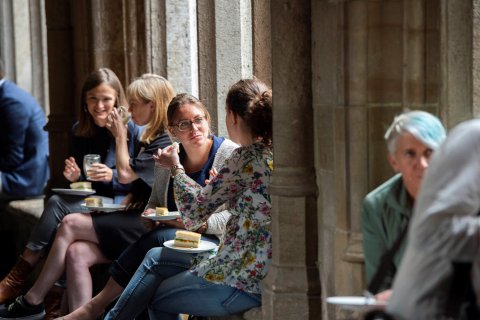
5 breakout sessions
True Price
During the workshop from True Price, Floor van Elzen, Michel Scholte and Andrea Rusman shared their methodology for measuring the true price of products, including the hidden costs of production such as unpaid environmental and social costs. They furthermore showed how to measure a living wage for producers in developing countries, as important aspect of calculating the true price of a product.
Social Entrepreneurship Initiative
Erik Stam and Niels Bosma from the University of Utrecht presented the ambition to build and develop a research platform that develops and disseminate new knowledge jointly with other key actors involved in ecosystems for social entrepreneurship. A start was made to form new collaborations and ideas that are needed to realize change that will result in a just, sustainable and inclusive society. The session was facilitated by Kim Kiszelnik who acts as the engagement manager for this research platform.
ABN AMRO
Liesbeth Kamphuis and Emilie Ottenvanger from ABN AMRO Impact Banking elaborated on the challenges of their innovative financing solutions in the agri commodities value chain. Their impact banking program offers smaller (individual) loans to groups of local farmers, impact on people and the environment is leading financial returns follow.
Van Doorne
Sjoerd Kamerbeek from Van Doorne Lawyers delivered an excellent in-depth workshop on mission drift in publicly listed companies, how can you stay on track with a sustainable strategy? As an example Sjoerd elaborated on a recent case he was involved in and on which he could share some valuable insights.
Social Impact Factory
The Social Impact Factory (SIF) in Utrecht ran a lively workshop on how to create a business plan for societal change. After Marit Schouten, a Social Impact Connector at SIF, shared the process, the audience divided up into groups and tried the model for themselves. It was a fun activity and led to creative ideas for societal change and interesting group discussions.
The Egyptian Plover
The closing panel of the day brought together two multinational companies and a corporate advisor. In a lively discussion, Philips’ Global Head of Government and Public Affairs, Jan-Willem Scheijgrond, DSM-Niaga’s Director of Strategic Growth, Lukas Hoex, and Steward Redqueen co-founder, Wouter Scheepens, exchanged views about the role and responsibilities of multinationals in promoting societal change. Philips’ Community Life Centres and DSM-Niaga’s circular carpets, are great examples of the collaboration between large international companies and their partners – be it small social or environmental entrepreneurs, or (non-) governmental agencies. With a reference to the Egyptian Plover bird, Scheepens made clear that both need each other in order to flourish. It seems like a great metaphor for mutually beneficial collaboration between different entities – as long as the crocodile does not get lazy or tired ...
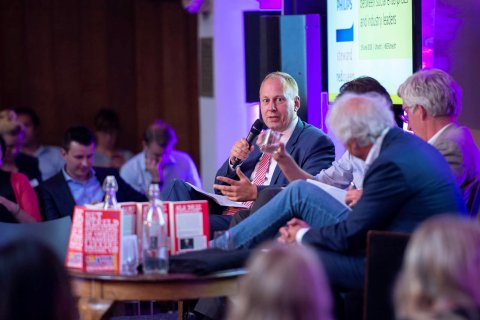
June 20th Academic Day
Wednesday June 20th marked the very first Utrecht Social Entrepreneurship Academic Day, organized by Utrecht University’s PhD’s on social entrepreneurship. Professor Erik Stam, head of the Economics Research Institute TKI, opened the day by expressing how multidisciplinary research can increase our understanding of important socio-economic phenomena represented by the Sustainable Development Goals.
Ute Stephan on shaping inclusive societies
Professor Ute Stephan, Aston Business School, gave an insightful overview of past and present research on social entrepreneurship. She showed that social entrepreneurship can help shape inclusive societies.
Professor Joost de Laat, leading the chair of Global Economic Challenges with UGlobe Center for Global Challenges at Utrecht University, shared the promises and pitfalls of involving experiments in research in the domains of economic development and social entrepreneurship.
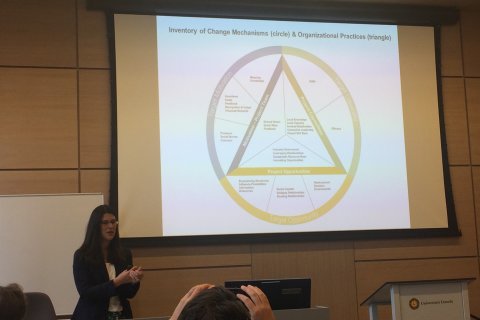
Academic paper development workshop
Participants who are in the process of developing academic papers got to know each other during a guided walk through the historical part of Utrecht. Afterwards, they discussed their work-in-progress with their peers, under supervision of Ute Stephan, Harry Hummels and Niels Bosma. They also received useful tips and tricks for publishing in high level academic journals from Ute Stephan. The day was considered to be very valuable and inspiring by the participants, who will update each other on their progress. We are looking forward to the second event next year already!
We are very proud this third edition of the Social Entrepreneurship Festival has inspired so much enthusiasm in our network, from students to social entrepreneurs to high-level executives. This would not have been possible without our SEI partners Tony’s Chocolonely, ABN AMRO and Van Doorne.


